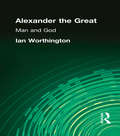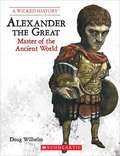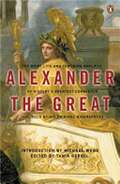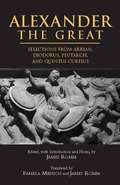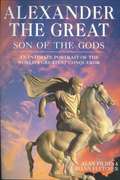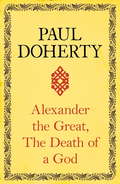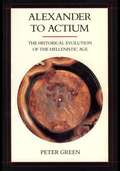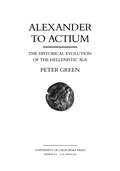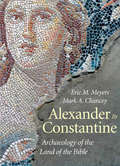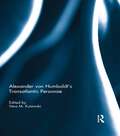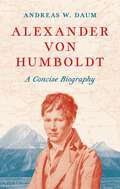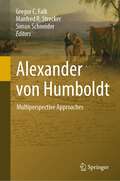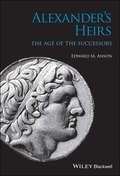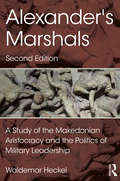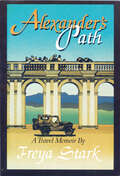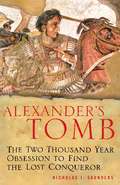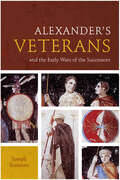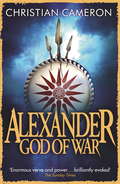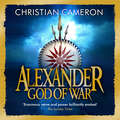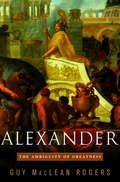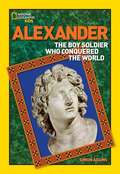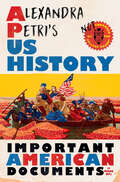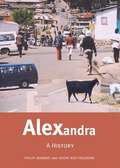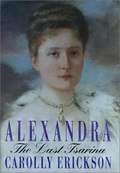- Table View
- List View
Alexander the Great: Man and God
by Ian WorthingtonAlexander the Great conquered territories on a superhuman scale and established an empire that stretched from Greece to India. He spread Greek culture and education throughout his empire, and was worshipped as a living god by many of his subjects. But how great is a leader responsible for the deaths on tens of thousands of people? A ruler who prefers constant warring to administering the peace? A man who believed he was a god, who murdered his friends, and recklessly put his soldiers lives at risk? Ian Worthington delves into Alexander's successes and failures, his paranoia, the murders he engineered, his megalomania, and his constant drinking. It presents a king corrupted by power and who, for his own personal ends, sacrificed the empire his father had fought to establish.
Alexander the Great: Master of the Ancient World
by Doug WilhelmA Wicked History is the definitive biography series for middle and high school students on the evil individuals who twisted the course of history. Newly revised editions include additional resources that supplement and support the core text.
Alexander the Great: Selected Texts from Arrian, Curtius and Plutarch
by Plutarch Arrian Quintus Curtius RufusInspired in his leadership, fearless in battle, and boundless in his ambition, Alexander the Great was worshiped as a god during his lifetime, and his legend has only grown since. Inheriting his father's empire at the age of twenty, Alexander resolved to expand it, and by the time of his death at thirty-two, his empire streched from Greece to India, spanning three continents and encompassing two million square miles. <p><p> Comprising selections from the writings of Arrian, Plutarch, and Quintus Curtius Rufus, this definitive biography of the greatest conqueror in history features an introduction on Alexander's enduring legacy by acclaimed British television personality and Princeton University Professor Michael Wood.
Alexander the Great: Selections From Arrian, Diodorus, Plutarch, and Quintus Curtius
by Plutarch James Romm Pamela Mensch Arrian Diodorus Quintus CurtiusComprised of relevant selections from the writings of four ancient historians, this volume provides a complete narrative of the important events in the life of Alexander the Great. The Introduction sets these works in historical context, from the conclusion of the Peloponnesian War through Alexander's conquest of Asia, and provides an assessment of Alexander's historical importance, as well as a survey of the central controversies surrounding his personality, aims and intentions. Includes a timeline, maps, bibliography, glossary, and index.
Alexander the Great: Son of the Gods
by Alan Fildes Joann FletcherThis book captures the sense of Alexander, his relationships and his achievements extremely well. Never ponderous, it nevertheless completely describes his singular achievements.
Alexander the Great: The Death of a God
by Paul DohertyWhat - or who - really killed the young conqueror of the known world?Master historian Paul Doherty investigates an outstanding figure who achieved so much before his premature end in this remarkable non-fiction work, Alexander the Great: The Death of a God. Perfect for fans of Philip Freeman and Robin Lane Fox.'Riveting... compelling... an important contribution to the literature on the period' - Sunday TimesAlexander the Great was an enigma, a man who wanted to be a god, a Greek who wanted to be Persian, a defender of liberties who spent most of his life taking away the liberties of others, and a king who could be compassionate yet also had the capacity to ruthlessly wipe out an ancient city. The Death of Alexander scrutinizes the circumstances surrounding the young king's death in the summer palace of the Persian kings. Did Alexander die of alcohol poisoning? Or where there other, more sinister factors involved? The great general had surrounded himself with outstanding captains of war. Was it they who ultimately made a decision to bring this young god's life to a violent, untimely end?What readers are saying about Paul Doherty:'Doherty proves that he is a scholar as well as a writer of novels''I could not stop reading this book by Paul Doherty as it is very well written, immensely readable and fascinating. For me an absolute MUST''Pure brilliance'
Alexander to Actium
by Peter GreenThe Hellenistic Age, the three extraordinary centuries from the death of Alexander in 323 B. C. to Octavian's final defeat of Antony and Cleopatra at the Battle of Actium, has offered a rich and variegated field of exploration for historians, philosophers, economists, and literary critics. Yet few scholars have attempted the daunting task of seeing the period whole, of refracting its achievements and reception through the lens of a single critical mind. Alexander to Actium was conceived and written to fill that gap. In this monumental work, Peter Green--noted scholar, writer, and critic--breaks with the traditional practice of dividing the Hellenistic world into discrete, repetitious studies of Seleucids, Ptolemies, Antigonids, and Attalids. He instead treats these successor kingdoms as a single, evolving, interrelated continuum. The result clarifies the political picture as never before. With the help of over 200 illustrations, Green surveys every significant aspect of Hellenistic cultural development, from mathematics to medicine, from philosophy to religion, from literature to the visual arts. Green offers a particularly trenchant analysis of what has been seen as the conscious dissemination in the East of Hellenistic culture, and finds it largely a myth fueled by Victorian scholars seeking justification for a no longer morally respectable imperialism. His work leaves us with a final impression of the Hellenistic Age as a world with haunting and disturbing resemblances to our own. This lively, personal survey of a period as colorful as it is complex will fascinate the general reader no less than students and scholars.
Alexander to Actium
by Peter GreenThe Hellenistic Age, the three extraordinary centuries from the death of Alexander in 323 B. C. to Octavian's final defeat of Antony and Cleopatra at the Battle of Actium, has offered a rich and variegated field of exploration for historians, philosophers, economists, and literary critics. Yet few scholars have attempted the daunting task of seeing the period whole, of refracting its achievements and reception through the lens of a single critical mind. Alexander to Actium was conceived and written to fill that gap.In this monumental work, Peter Green--noted scholar, writer, and critic--breaks with the traditional practice of dividing the Hellenistic world into discrete, repetitious studies of Seleucids, Ptolemies, Antigonids, and Attalids. He instead treats these successor kingdoms as a single, evolving, interrelated continuum. The result clarifies the political picture as never before. With the help of over 200 illustrations, Green surveys every significant aspect of Hellenistic cultural development, from mathematics to medicine, from philosophy to religion, from literature to the visual arts.Green offers a particularly trenchant analysis of what has been seen as the conscious dissemination in the East of Hellenistic culture, and finds it largely a myth fueled by Victorian scholars seeking justification for a no longer morally respectable imperialism. His work leaves us with a final impression of the Hellenistic Age as a world with haunting and disturbing resemblances to our own. This lively, personal survey of a period as colorful as it is complex will fascinate the general reader no less than students and scholars.
Alexander to Constantine
by Eric M. Meyers Mark A. ChanceyDrawing on the most recent, groundbreaking archaeological research, Eric M. Meyers and Mark A. Chancey re-narrate the history of ancient Palestine in this richly illustrated and expertly integrated book. Spanning from the conquest of Alexander the Great in the fourth century BCE until the reign of the Roman emperor Constantine in the fourth century CE, they synthesize archaeological evidence with ancient literary sources (including the Bible) to offer a sustained overview of the tumultuous intellectual and religious changes that impacted world history during the Greco-Roman period. The authors demonstrate how the transformation of the ancient Near East under the influence of the Greeks and then the Romans led to foundational changes in both the material and intellectual worlds of the Levant. Palestine's subjection to Hellenistic kingdoms, its rule by the Hasmonean and Herodian dynasties, the two disastrous Jewish revolts against Rome, and its full incorporation into the Roman Empire provide a background for the emergence of Christianity. The authors observe in the archaeological record how Judaism and Christianity were virtually undistinguishable for centuries, until the rise of imperial Christianity with Emperor Constantine. The only book-length overview available that focuses on the archaeology of Palestine in this period, this comprehensive and powerfully illuminating work sheds new light on the lands of the Bible.
Alexander von Humboldt's Transatlantic Personae
by Vera M. KutzinskiWho was Alexander von Humboldt? Was he really a lone genius? Was he another European apologist for colonialism in the Americas or the father of Latin American independence? Was he a roving Romanticist, or did his sensibilities belong to the Enlightenment? Naturalist, philosopher, historian, and proto-sociologist--to name just some of the fields to which he contributed--, Humboldt is impossible to contain in a single identity or definition. His voluminous writings range across so many different fields of knowledge that his scholarly-scientific personae multiplied even during his lifetime, and they have continued to proliferate since his death in 1859. A household word throughout the nineteenth century, Humboldt was eventually eclipsed by Charles Darwin (whose own travels had been motivated by Humboldt’s) and disappeared from view for much of the twentieth century, notably in the United States. The essays in this collection testify to the renewed interest that Alexander von Humboldt’s multi-faceted work is inspiring in the twenty-first century, especially among cultural and literary historians from both sides of the Atlantic. This book was originally published as a special issue of Atlantic Studies.
Alexander von Humboldt: A Concise Biography
by Andreas W. DaumAn engaging account of the life and work of the legendary polymath Alexander von HumboldtIn this lucid biography, Andreas Daum offers a succinct and novel interpretation of the life and oeuvre of Alexander von Humboldt (1769―1859). A Prussian nobleman born into the age of European Enlightenment, Humboldt was a contemporary of Napoleon, Simón Bolívar, and Charles Darwin. As a naturalist and scholar, he traveled the world, from the Americas to Central Asia, and recorded his observations in multiple volumes. Humboldt is still admired today for his interdisciplinary outreach and ecological awareness.Moving beyond the conventional views of Humboldt as either intellectual superhero or gentleman colonizer, Daum&’s incisive account focuses on Humboldt in the context of the tumultuous period of history in which he lived. Humboldt embodied the contradictions that marked the age of Atlantic Revolutions. He became a critic of slavery and embraced the emerging civil society but remained close to authoritarian rulers. He dedicated his life to scientific research yet was driven by emotional impulses and pleaded for an aesthetic appreciation of nature. Daum introduces a man passionately striving to establish a &“cosmic&” understanding of nature while grappling with the era&’s explosion of knowledge.This book provides the first concise biography of Humboldt, covering all periods of his life, exploring his personality, the vast range of his works, and his intellectual networks. Daum helps us understand Humboldt as a seminal historical figure and illuminates the role of science at the dawn of the global world.
Alexander von Humboldt: Multiperspective Approaches
by Gregor C. Falk Manfred R. Strecker Simon SchneiderThis book aims to view and to understand Alexander von Humboldt from different perspectives and in varying disciplinary contexts. His contributions addressed numerous topics in the earth but also life sciences—spanning from geo-botany, climatology, paleontology, oceanography, mineralogy, resources, and hydrogeology to links between the environmental impact of humans, erosion, and climate change. From the very beginning, he paved the way for a modern, integrated earth system science approach to decipher, characterize, and model the different forcing factors and their feedback mechanisms. It becomes obvious that Humboldt’s holistic approach is far beyond simple description and empiric data collection. As documented and analyzed in the different texts of this volume, he combines observation and analysis with emotions and subjective perceptions in a very affectionate way. However, this publication does not intend to add another encyclopedic text compilation but to observe and critically analyze this unique personality´s relevance in a modern context, particularly in discussing environmental and social key issues in the twenty-first century.
Alexander's Heirs
by Edward M. AnsonAlexander's Heirs offers a narrative account of the approximately forty years following the death of Alexander the Great, during which his generals vied for control of his vast empire, and through their conflicts and politics ultimately created the Hellenistic Age.Offers an account of the power struggles between Alexander's rival generals in the forty year period following his deathDiscusses how Alexander's vast empire ultimately became the Hellenistic WorldMakes full use of primary and secondary sourcesAccessible to a broad audience of students, university scholars, and the educated general readerExplores important scholarly debates on the Diadochi
Alexander's Marshals: A Study of the Makedonian Aristocracy and the Politics of Military Leadership
by Waldemar HeckelThis substantially revised and updated second edition of The Marshals of Alexander’s Empire (1992) examines Alexander’s most important officers, who commanded army units and were involved in military and political deliberations. Chapters on these men have been expanded, giving greater attention to personalities, bias in the sources, and the social as well as military setting, including more on familial connections and regional origins in an attempt to create a better understanding of factions. The major confrontations, military and political, are treated in greater detail within the biographies, and a discussion of the organization and command structure of the Makedonian army has been added.
Alexander's Path: A Travel Memoir
by Freya StarkA memoir of a woman’s trek through rural Turkey and its ancient history: “A sharp-eyed, thoughtful, and knowledgeable traveler.” —The New York TimesIn 1956, Freya Stark traveled through back-country Turkey by truck and horseback, often alone. She reached places little visited and never written about. The country people welcomed her with generosity despite their meager resources. She was traveling in time as well, and found significance in recalling the life of Alexander the Great as she retraced his journey in reverse. Twenty-two centuries earlier he was the first to dream of a united world—and Stark’s observations reflect not just this land’s physical connections to antiquity but the human longings that persist through millennia.“One of the finest travel writers of [the twentieth] century.” —The New Yorker“Stark’s forte is the ability to take the reader to an ancient site and, through the scanty remains that are left today, evoke the past of which they were a part.” —The New York Times“Describing a Jeep-and-mule trek she undertook in 1956 through the back country of Anatolia, Stark retraces (in reverse) the progress of Alexander the Great more than two millennia before . . . Stark has a wonderfully understated sense of humor.” —Kirkus Reviews
Alexander's Tomb: The Two-Thousand Year Obsession to Find the Lost Conquerer
by Nicholas J. SaundersAlexander the Great is a towering figure in world history, but despite our long-held fascination with him, his burial site is unknown. The search for Alexander's tomb began soon after his untimely death in 323 B.C. and continues even today. The epic pursuit of the tomb spans continents and centuries, and involves some of history's most iconic figures. This is the story not of a brief and spectacular life, but of a momentous and unexplained death, multiple burials, and the seemingly never-ending quest for a man-god's final resting place. Bringing together thousands of years of speculation, as well as new questions about the ramifications of actually solving the puzzle, Alexander's Tomb is a fascinating look at one of archaeology's greatest mysteries.
Alexander's Veterans and the Early Wars of the Successors (Fordyce W. Mitchel Memorial Lecture Ser.)
by Joseph RoismanFrom antiquity until now, most writers who have chronicled the events following the death of Alexander the Great have viewed this history through the careers, ambitions, and perspectives of Alexander's elite successors. Few historians have probed the experiences and attitudes of the ordinary soldiers who followed Alexander on his campaigns and who were divided among his successors as they fought for control of his empire after his death. Yet the veterans played an important role in helping to shape the character and contours of the Hellenistic world. This path-finding book offers the first in-depth investigation of the Macedonian veterans' experience during a crucial turning point in Greek history (323-316 BCE). Joseph Roisman discusses the military, social, and political circumstances that shaped the history of Alexander's veterans, giving special attention to issues such as the soldiers' conduct on and off the battlefield, the army assemblies, the volatile relationship between the troops and their generals, and other related themes, all from the perspective of the rank-and-file. Roisman also re-examines the biases of the ancient sources and how they affected ancient and modern depictions of Alexander's veterans, as well as Alexander's conflicts with his army, the veterans' motives and goals, and their political contributions to Hellenistic history. He pays special attention to the Silver Shields, a group of Macedonian veterans famous for their invincibility and martial prowess, and assesses whether or not they deserved their formidable reputation. Joseph Roisman is Professor of Classics at Colby College. He has authored and edited numerous books and articles on Greek history, historiography, and oratory, including Brill's Companion to Alexander the Great, The Rhetoric of Manhood: Masculinity in the Attic Orators, The Rhetoric of Conspiracy in Ancient Athens, A Companion to Ancient Macedonia (with Ian Worthington), and Greek History from Homer to Alexander.
Alexander: God of War
by Christian CameronThe ultimate historical adventure novel: the life of Alexander the Great in a single, epic volume.To many he was a god. To others he was a monster. The truth is even more extraordinary.As a boy, Alexander dreamed of matching the heroic feats of Achilles. At eighteen he led the Macedonian cavalry to a stunning victory against the Greeks. By twenty-five he had crushed the Persians in three monumental battles and was the master of the greatest empire the world had ever seen. Men began to call him a god. But behind the legend was another, more complex story.Narrated by his boyhood friend Ptolemy, this is the story of Alexander as you have never heard it before: raw, intimate, thrilling - a story of extraordinary daring and unimaginable endurance; of wanton destruction and murderous intrigue - the epic tragedy of a man who aimed to be more than human.
Alexander: God of War
by Christian CameronThe ultimate historical adventure novel: the life of Alexander the Great in a single, epic volume.To many he was a god. To others he was a monster. The truth is even more extraordinary.As a boy, Alexander dreamed of matching the heroic feats of Achilles. At eighteen he led the Macedonian cavalry to a stunning victory against the Greeks. By twenty-five he had crushed the Persians in three monumental battles and was the master of the greatest empire the world had ever seen. Men began to call him a god. But behind the legend was another, more complex story.Narrated by his boyhood friend Ptolemy, this is the story of Alexander as you have never heard it before: raw, intimate, thrilling - a story of extraordinary daring and unimaginable endurance; of wanton destruction and murderous intrigue - the epic tragedy of a man who aimed to be more than human.
Alexander: God of War
by Christian CameronThe ultimate historical adventure novel: the life of Alexander the Great in a single, epic volume.To many he was a god. To others he was a monster. The truth is even more extraordinary.As a boy, Alexander dreamed of matching the heroic feats of Achilles. At eighteen he led the Macedonian cavalry to a stunning victory against the Greeks. By twenty-five he had crushed the Persians in three monumental battles and was the master of the greatest empire the world had ever seen. Men began to call him a god. But behind the legend was another, more complex story.Narrated by his boyhood friend Ptolemy, this is the story of Alexander as you have never heard it before: raw, intimate, thrilling - a story of extraordinary daring and unimaginable endurance; of wanton destruction and murderous intrigue - the epic tragedy of a man who aimed to be more than human.
Alexander: The Ambiguity of Greatness
by Guy Maclean RogersFor nearly two and a half millennia, Alexander the Great has loomed over history as a legend–and an enigma. Wounded repeatedly but always triumphant in battle, he conquered most of the known world, only to die mysteriously at the age of thirty-two. In his day he was revered as a god; in our day he has been reviled as a mass murderer, a tyrant as brutal as Stalin or Hitler. Who was the man behind the mask of power? Why did Alexander embark on an unprecedented program of global domination? What accounted for his astonishing success on the battlefield? In this luminous new biography, the esteemed classical scholar and historian Guy MacLean Rogers sifts through thousands of years of history and myth to uncover the truth about this complex, ambiguous genius.Ascending to the throne of Macedonia after the assassination of his father, King Philip II, Alexander discovered while barely out of his teens that he had an extraordinary talent and a boundless appetite for military conquest. A virtuoso of violence, he was gifted with an uncanny ability to visualize how a battle would unfold, coupled with devastating decisiveness in the field. Granicus, Issos, Gaugamela, Hydaspes–as the victories mounted, Alexander’s passion for conquest expanded from cities to countries to continents. When Persia, the greatest empire of his day, fell before him, he marched at once on India, intending to add it to his holdings.As Rogers shows, Alexander’s military prowess only heightened his exuberant sexuality. Though his taste for multiple partners, both male and female, was tolerated, Alexander’s relatively enlightened treatment of women was nothing short of revolutionary. He outlawed rape, he placed intelligent women in positions of authority, and he chose his wives from among the peoples he conquered. Indeed, as Rogers argues, Alexander’s fascination with Persian culture, customs, and sexual practices may have led to his downfall, perhaps even to his death.Alexander emerges as a charismatic and surprisingly modern figure–neither a messiah nor a genocidal butcher but one of the most imaginative and daring military tacticians of all time. Balanced and authoritative, this brilliant portrait brings Alexander to life as a man, without diminishing the power of the legend.
Alexander: The Boy Soldier Who Conquered the World (National Geographic World History Biographies)
by Simon AdamsThis concise, visual biography of one of the world's most fascinating historical figures, engages kids by using colorful photographs, illustrations, maps, and archival objects, as well as lively narrative. Using period artwork, primary source accounts, photographs, artifacts and a lively, engaging text, this book examines the life of Alexander the Great, from his childhood to his major achievements and victories in battle.
Alexandra Petri's US History (I Made Up): Important American Documents (i Made Up)
by Alexandra Petri“Satire at the highest level.… [A] godsend of a book.” —Amy Fusselman, Washington Post A witty, absurdist satire of the last 500 years, Alexandra Petri’s US History is the fake textbook you never knew you needed! As a columnist for the Washington Post, Alexandra Petri has watched in real time as those who didn’t learn from history have been forced to repeat it. And repeat it. And repeat it. If we repeat history one more time, we’re going to fail! Maybe it’s time for a new textbook. Alexandra Petri’s US History contains a lost (invented!) history of America. (A history for people disappointed that the only president whose weird sex letters we have is Warren G. Harding.) Petri’s "historical fan fiction" draws on real events and completely absurd fabrications to create a laugh-out-loud, irreverent takedown of our nation’s complicated past. On Petri’s deranged timeline, John and Abigail Adams try sexting, the March sisters from Little Women are sixty feet tall, and Susan Sontag goes to summer camp. Nearly eighty short, hilarious pieces span centuries of American history and culture. Ayn Rand rewrites The Little Engine That Could. Nikola Tesla’s friends stage an intervention when he falls in love with a pigeon. The characters from Sesame Street invade Normandy. And Mark Twain—who famously said reports of his death had been greatly exaggerated—offers a detailed account of his undeath, in which he becomes a zombie. This side-splitting work of historical humor shows why Alexandra Petri has been hailed as a "genius,"* a "national treasure,"† and "one of the funniest writers alive"‡. *Olivia Nuzzi, Katha Pollitt †Julia Ioffe, Katy Tur, John Scalzi, Chuck Wendig, Jamil Smith, and Susan Hennessey ‡Randall Munroe
Alexandra: A history
by Phil Bonner Noor NieftagodienAlexandra: A History is a social and political history of one of South Africa’s oldest townships. It begins with the founding of Alexandra as a freehold township in 1912 and traces its growth as a centre of black working-class life through the early years before the Nationalist government, through the struggles of the apartheid era and into the present day. Declared as a location for ‘natives and coloureds’, Alexandra became home to a diverse population where stand owners, tenants, squatters, hostel-dwellers, workers and migrants from every corner of the country converged to make a new life for themselves near the economic hub of Johannesburg. The stories of ordinary people are at the core of the township’s history. Based on numerous life-history interviews with residents and previously unexamined archive sources, the book portrays in vivid detail the daily struggles and tribulations of the people of Alexandra. A significant focus is the rich history of political resistance, in which political organisations and civic movements organised bus boycotts, anti-removal and anti-pass campaigns, and mobilised for housing and a better life for the township’s residents. But the book also tells the stories of daily life, of the making of urban cultures and of the infamous Spoilers and Msomi gangs. Over weekends Alexandra came alive as soccer matches, church services and shebeens vie for the attention of residents. Alexandra: A History highlights the social complexities of the township, which at times caused tension between different segments of the population. Above all else, despite a long history of hardship and adversity, the community spirit of the people of Alexandra, expressed in a fiercely loyal love of their township home, has repeatedly triumphed and endured.
Alexandra: The Last Tsarina
by Carolly EricksonIntimate biographical historical about Alexandra, last Tsarina of Russia.A biographical histolrical about Alexandra, last Tsarina of Russia.
